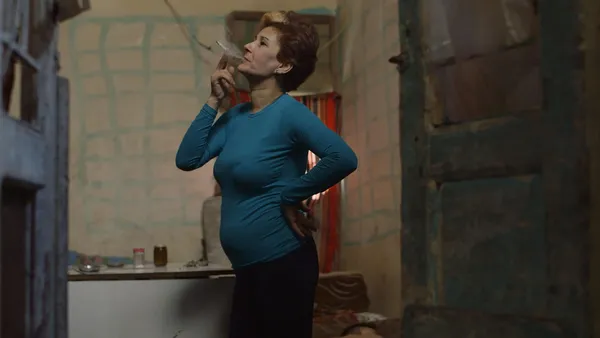Eye For Film >> Movies >> Underdown (2018) Film Review
Underdown
Reviewed by: Amber Wilkinson

Sarah Kaskas' documentary about the harshness of life for many in Beirut opens by immersing us in the cityscape, the sound tuning into various emergency calls and conversations, including timelapse footage. Soon, she'll take us down to street level, to explore the lives of a taxi driver, a young Syrian refugee and his friends and three generations of a family. Cab driver Abu describes them as the "underdown", "lower than low".
This sympathetic and largely observational portrait shines a light of a raft of social problems, many of which stem from displacement and lack of any sort of government safety net. Abu - an elderly Palestinian refugee who prefers to use rented taxi as the roof over his head rather than stay in a camp - is sharply intelligent but eccentric, just scraping by, apparently spending what spare cash he does earn on cheap alcohol, which he sips in between fares. Ali is already on the streets at age 11, preferring them to home, spending his days hanging out with a couple of older friends who have formed a sort of makeshift pseudo-family. Lebanese mum Samya, meanwhile, lives in her cramped home with her family, including her mother who is gradually losing her sight to glaucoma because they can't afford the operation to fix it. We soon see that she and her family also use alcohol as a crutch - and who can blame them?

Kaskas makes the step up from short films to her first feature with ease. She is an attentive listener - perhaps a result of spending quite a bit of her career to date as a sound recordist and engineer - taking time to let each person tell their story in their own way. Although the film is observational rather than explanatory, she allows a pattern to develop, showing how these three stories are not only linked by poverty but by the trappings that can lead to it and follow - from war and violence to addiction.
Beirut is shown as a city in social flux. This is little surprise given that in addition to the existing displaced Palestinians living in Lebanon - estimated to represent around 10 per cent of the populace and the subject of excellent documentary A World Not Ours - tens of thousands of refugees have fled there more recently from neighbouring Syria. It's easy to see the challenge of helping people on the margins of society when there are so many of them, although there's little evidence presented here that the government is trying.
This is no pity party, however, all the people here are shown to be resourceful and resilient against the odds. You only hope that Ali's life story doesn't turn into a mirror of Abu's in 40 or 50 years time.
Reviewed on: 05 Apr 2019
















